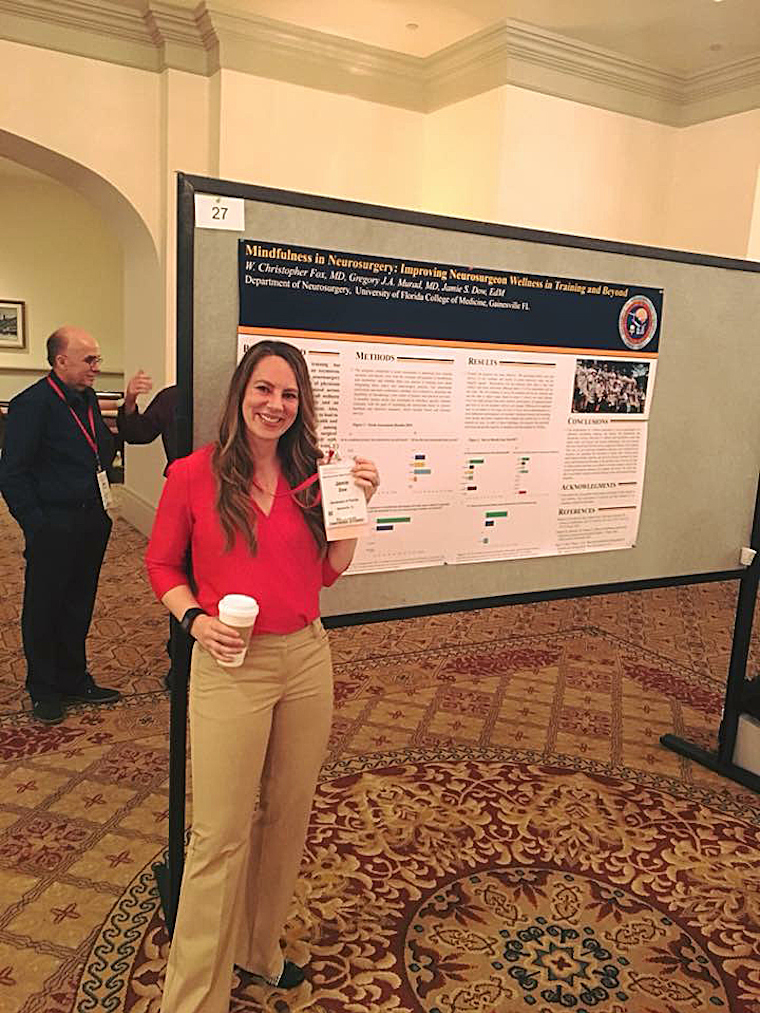Jamie Dow, EdM, is assistant director for resident education and training at the University of Florida. Her poster, Mindfulness in Neurosurgery: Improving Neurosurgeon Wellness in Training and Beyond (with co-authors W. Christopher Fox, MD, Associate Program Director, University of Florida, and Gregory Murad, MD, Program Director, University of Florida), looked at wellness in neurosurgery, which Dow says “has traditionally been considered an oxymoron.” However, as priorities among neurological surgery residents evolve and the effects of physician burnout are increasingly recognized across specialties, life balance and overall well-being have become areas of emphasis and an opportunity for program improvement. Recognizing this, and following faculty member and resident discussion about training experiences and personal strategies to avoid burnout, led to the design of a wellness curriculum incorporating mindfulness practice. We asked Ms. Dow to talk to us a bit more about her project and poster.

ACGME: Tell us about your academic and professional role.
Dow: Our education team consists of the program director, Gregory Murad, MD, associate program director, W. Chris Fox, MD, a program coordinator, and myself as the assistant director of education and training. In my role, I oversee the accreditation process and assist in the analysis of the effectiveness of evaluations to establish future program direction. Most importantly, and what I enjoy most, is collaborating with our team and participating in the formulation and implementation of innovative educational initiatives.
ACGME: Can you briefly describe your project for us?
Dow: We started a wellness program due to changes in trainee expectations and attitudes regarding perceptions of what residency training should be, wider concerns regarding physician burnout and suicide, and because similar techniques have been widely and successfully used in other areas, such as collegiate/professional athletics and in the business world.
ACGME: What inspired you to do this project?
Dow: Wellness is of significant interest to our faculty members, mainly the area of meditation and eastern religion/philosophy and the neuroscience-neurophysiology of meditation techniques. One of our faculty members is a former collegiate athlete who credits mindfulness and meditation techniques for improving focus, emotional control, and dealing with distractions—all techniques he continues to use in his personal and professional practice. Residents noticed his use of some of these techniques in the professional setting, and they became curious and interested, which led us to explore opportunities and resources for brining mindfulness and meditation practices into our program.
ACGME: What did you discover?
Dow: Initially, the sessions were met with some skepticism. Residents seemed to be slightly uncomfortable sitting in a room with their eyes closed trying to focus. Many residents felt like there were so many more things they could be doing vs. sitting in a room trying to focus on a guided meditation. After the initial session, and with faculty member support and commitment, residents engaged in the process and believed, overall, it was beneficial.
ACGME: What was the main takeaway?
Dow: The main takeaway is that the majority of residents believed there was some benefit to the practice of meditation and its effects on focus, emotional control, and overall well-being.
ACGME: Who could benefit from this?
Dow: We believe that mindfulness practice is an easily transferrable activity and that all residents, fellows, faculty members, and staff members can benefit from mindfulness practice in some form.
ACGME: Any additional follow-up plans?
Dow: We have continued our wellness series, which still includes mindfulness practice and meditation sessions. Additionally, we have expanded the series to include other wellness topics (financial wellness, leadership, goal setting, etc.), with special attention to subjects of resident interest and team building activities. With resident input and feedback, we continue to develop and refine the series as a part of our curriculum.

